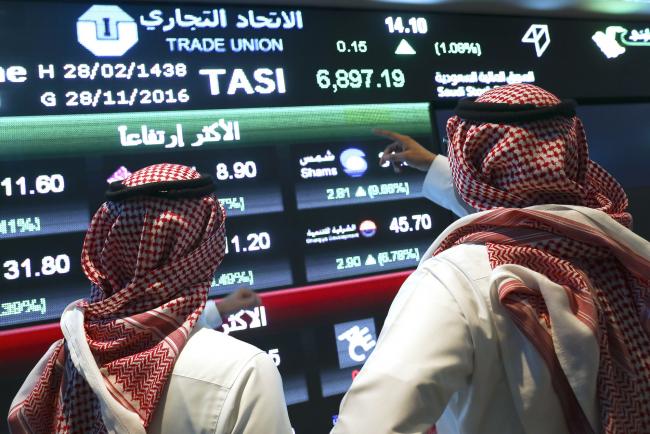(Bloomberg) -- A slump in stocks followed by an unexplained rebound. A bond market that appeared to be driven by an entirely different narrative. And at the end of it all, a gauge of volatility at its highest in almost three years.
By any measure, the past few days in Saudi Arabia’s markets have been a wild ride, as the unfolding drama surrounding the disappearance of Jamal Khashoggi drove prices this way and that.
But far from being unusual, the swings have merely served to underline an inescapable fact about the kingdom’s markets -- that it’s hard to know what determines price movements at the best of times.
“It’s difficult to invest money in a black box,” said Ekaterina Iliouchenko, a Frankfurt-based money manager at Union Investment Privatfonds GmbH. Saudi Arabia’s “openness to the investor community is a problem,” she said.
That lack of transparency is under mounting scrutiny because the kingdom -- home to the $485 billion Tadawul stock market, the region’s biggest -- has sought for the past three years to make itself more accessible and open to foreign investors. Crown Prince Mohammed bin Salman wants to wean the kingdom off revenue from crude and attract more foreign investors, a key element of which is the planned sale of a stake in Saudi Aramco, the national oil company.
Some fund managers say accessing information about Saudi stocks or companies isn’t easy, sometimes near impossible. Not only are some company announcements just in Arabic, executives aren’t used to the level of scrutiny demanded by global funds.
“I can call a Russian company’s investor-relations department and get an answer within a couple of hours,” Iliouchenko said, adding that she failed to find a plausible explanation for the sudden drop in share prices a month ago. “In Saudi, it’s even hard to get quarterly results in English,” and coverage from the sell-side is limited, or the quality “not great,” she said.
There’s Progress
That’s not to say Saudi Arabia’s bourse isn’t working to align itself with international standards. Since 2015, it allowed investors abroad to trade stocks directly, introduced new corporate-governance rules and adopted global accounting standards, among other measures. While foreigners currently own only about 5 percent of the nation’s equity market, MSCI Inc.’s decision in June to include the nation’s stocks in its emerging-market index next year was a recognition of the exchange’s progress.
- The bourse has given out more than 280 qualified foreign investor licenses. About 200 more are in the pipeline, according to Sarah Al-Suhaimi, chairwoman of the Tadawul
- All listed companies are expected to disclose both in English in Arabic in the next two years, from only about a third now, Chief Executive Officer Khalid Al Hussan said in May
- Foreign investors have been net buyers of almost 9.5 billion riyals ($2.5 billion) of Saudi stocks this year
“It’s less about the level of transparency and more about whether it’s moving in the right direction, and Saudi Arabia has made progress in that direction,” said Michael Bolliger, the Zurich-based head of emerging-market asset allocation at UBS Wealth Management’s chief investment office. But investors need to decide “whether they’re willing to tolerate and incorporate geopolitical risk into their portfolios,” he said.
Risk Matters
This month’s mysterious disappearance of Washington Post columnist Khashoggi, and subsequent fears the U.S. may punish Saudi Arabia if the kingdom is found to be responsible, roiled the nation’s assets this week.
While bonds fell and riyal forwards jumped when foreign investors returned to work Monday, stocks rallied the most in more than a year. It was an anomaly that prompted some traders to guess government-related funds were propping up shares, speculation that was never confirmed. The Tadawul All Share Index had tumbled as much as 7 percent on Sunday before partially recovering to end the day 3.5 percent lower.
A dearth of information means higher volatility and, theoretically, lower valuations for Saudi shares, said Yevgeny Ruzhitsky, a New York-based senior research analyst at Neuberger Berman Group. The gauge’s 10-day volatility climbed to the highest level since January 2016, and the iShares MSCI Saudi Arabia ETF on Tuesday suffered its worst outflow on record.
Investor confidence has been frayed since June last year, when the Saudis led a four-nation campaign to isolate Qatar, followed by an anti-corruption crackdown in November that saw billionaires imprisoned in the Ritz-Carlton in Riyadh. There were further bumps when the kingdom was involved in a dispute with Canada following its criticism of the jailing of Saudi rights activists. All set against mounting tension with Iran.
“Other than macro and geopolitical challenges, I would say transparency or the level of disclosure, quality of management and access to management are probably the biggest concerns today,” Ruzhitsky said.
